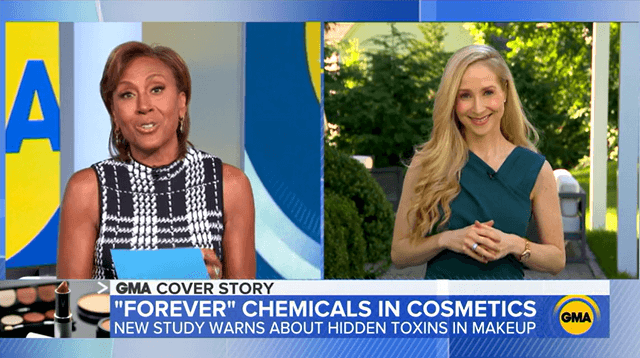Case Study: PFAS in Cosmetics
Research + Partners + Communications = Change
Research: 
The Green Science Policy Institute collaborated with the University of Notre Dame, University of Toronto, Indiana University, and ETH Zurich to test 231 popular makeup products from the U.S. and Canada. In June 2021, we published our results in the peer-reviewed journal Environmental Science and Technology Letters. We found high fluorine levels—indicating the probable presence of PFAS—in just over half of makeup tested. Some of the products with the highest fluorine levels underwent further analysis and were found to contain at least four PFAS of concern. The majority of products with high fluorine, including those confirmed to have PFAS, had no PFAS listed on the label.
Partners:
- Collaborating with staff of U.S. Senators and Representatives who lead on PFAS issues, we were able to coordinate the study’s publication date with the introduction of bipartisan Senate and House versions of the No PFAS in Cosmetics Act instructing the FDA to ban all PFAS in cosmetics.
- The advocacy group Breast Cancer Action prepared a campaign for consumers to urge their representatives to support the No PFAS in Cosmetics Act.
- Breast Cancer Prevention Partners invited 600 cosmetics manufacturers and retailers to support the legislation and attend our web briefing the day our paper went online and the Senate bill was introduced.
Communications:
- We wrote a strong press release and pitched to reporters (including breaking news, health, science and policy, women’s lifestyle, and cosmetics trade reporters) under embargo starting one week before the publication date.
- We published an op-ed in The Hill on the day of the release.
- Our web briefing with co-authors, Senate and House legislators sponsoring the No PFAS in Cosmetics Act, and noted PFAS attorney Rob Bilott was attended by numerous participants including more than 40 cosmetics manufacturers and retailers as well as press, NGOs.
- We created a page on our website and tip sheet to help cosmetics companies eliminate PFAS and also invited them to schedule meetings with our team.
Results:
- The study was widely covered by the media, including Good Morning America, CNN, The Guardian, the Associated Press, and hundreds more. As a result, the study achieved the highest Altimetric score of any paper published in Environmental Science & Technology Letters until 2021 and has had nearly 100,000 downloads.
- Through Breast Cancer Action’s campaign, more than 700 people wrote their representatives urging them to support the No PFAS in Cosmetics Act. Cosmetics companies have responded to inquiries from reporters and consumers about their use of PFAS, and some have made new commitments and statements:
- After being pressed by a reporter, a Kylie Cosmetics spokesperson said their relaunched makeup will not contain any “perfluorinated compounds”
- Kinder Beauty Box announced it will “take steps” to eliminate PFAS based on the study
- Annmarie Cosmetics joined our PFAS-free list
- Thrive Causemetics tweeted they do not use PFAS
- Tarte Cosmetics said in an Instagram comment their mascara is PFAS-free
- Elate Cosmetics tweeted they do not use PFAS
- California Governor Gavin Newsom signed AB2771 - the PFAS Free Beauty Act - into law in September 2022. The Act bans the entire class of PFAS from being intentionally added to personal care and beauty products sold in California.